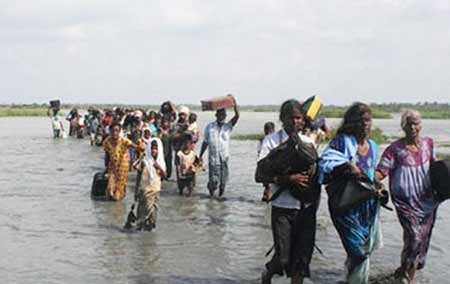Wood said the US government has credible reports of increasing casualties as a result of the intensified military actions and he called on both parties to refrain from indiscriminate fire and shelling into and from the NFZ.
He urged the government of Sri Lanka to allow international observers to determine more precisely how many civilians were left in the area.
He said the United States also backed calls by UN Secretary General Ban Ki-moon for UN staff to enter the no-fire zone to facilitate relief operations and the evacuation of civilians.
Norwegian Environment and International Development Minister Erik Solheim, who brokered a ceasefire between the government and the LTTE in 2002, has called on the Sri Lankan government and the LTTE to avoid further civilian losses, by refraining from firing into or attacking NFZ.
"It is unacceptable that hundreds of civilians have been killed or wounded in the latest stages of the fighting in Sri Lanka. This could have been avoided," Sri Lanka's leading English newspaper Daily Mirror on Wednesday quoted Solheim as saying.
Solheim stressed that the significant civilian losses could have been avoided if the government and the LTTE had sought a political end to the war.
 |
|
In this photograph released by the Sri Lankan military April 21, 2009 shows civilians escape from an area controlled by Tamil Tigers in the north-east of Sri Lanka. [Xinhua]
|
The Sri Lankan government has rejected all ceasefire calls so far, saying it is unnecessary as large number of civilians are fleeing to government controlled areas and the government is on the verge of completely crushing the LTTE.
Sri Lankan President Mahinda Rajapakse on Monday rejected the request by British Prime Minister Gordon Brown for a pause in military action, as well as Brown's offer to send a special envoy to Sri Lanka.
Defense spokesman Rambukwella said the government would not allow anyone to "barge" into the country and would turn a deaf ear to international criticism especially at a time when the war was almost won by the security forces.
The LTTE, on the other hand, said on Tuesday that they would never surrender after the Sri Lankan government gave them the ultimatum until noon Tuesday to surrender or be destroyed.
Seevaratnam Puleedevan, secretary-general of the LTTE peace secretariat, told the media that LTTE leader Prabhakaran was inside the NFZ and directing the war against the Sri Lankan armed forces.
He also urged the international community to intervene by forcing a permanent ceasefire, which the government has ruled out.
The International Committee of the Red Cross (ICRC) has called for exceptional precautionary measures to minimize further bloodshed in the NFZ.
"What we are seeing is intense fighting in a very small area overcrowded with civilians who have fled there. The situation is nothing short of catastrophic. Ongoing fighting has killed or wounded hundreds of civilians who have only minimal access to medical care," the ICRC said in a statement on Tuesday.
"The LTTE must keep its fighters and other military resources well away from places where civilians are concentrated, and allow civilians who want to leave the area to do so safely," said the statement.
"On their part, government forces are obliged to ensure that the methods and means of warfare they employ make it possible to clearly distinguish at all times between civilians and civilian objects, on the one hand, and military objectives, on the other," the statement added.
Claiming discrimination at the hands of Sinhamese dominated governments, the LTTE began to fight for an independent Tamil homeland in the north and east since the mid-1980s, resulting in the killing of more than 70,000 in one of the world's longest civil war.
The current Sri Lankan government began to launch a massive military assault against the LTTE in 2006, capturing almost all of the 15,000-sq-km territory controlled by the LTTE.
Military leaders say the LTTE's conventional force have been nearly crushed, though the organization may be able to fight a hit-and-run guerrilla war for a long time in the future.
However, analysts fear while the longest war in the world might come to a bloody conclusion, it will be hard for the island to enjoy genuine peace without a credible political solution acceptable to the minority Tamils being enforced.
(Xinhua News Agency April 23, 2009)